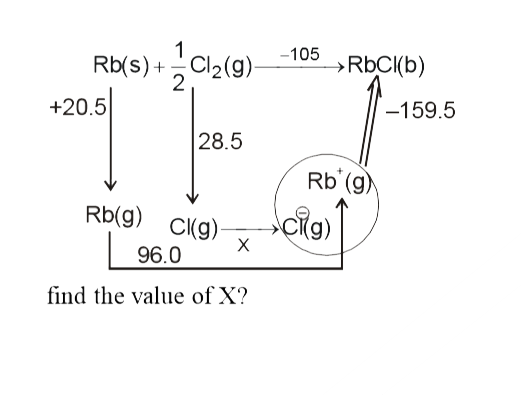The born-Haber cycle for formation of rubidium chloride (RbCl) is given bellow (the enthalpies are in kcal mol−1)
Find the value of X ?
Topper's Solved these Questions
- BOOK - MOTIONCHAPTER - THERMOCHEMISTRY EXERCISE - EXERCISE -1 SECTION - A5videos
THERMOCHEMISTRY
- BOOK - MOTIONCHAPTER - THERMOCHEMISTRY EXERCISE - EXERCISE -1 SECTION - B9videos
THERMOCHEMISTRY
- BOOK - MOTIONCHAPTER - SURFACE CHEMISTRYEXERCISE - Exercise - 3 (Level-II)12videos
SURFACE CHEMISTRY
- BOOK - MOTIONCHAPTER - THERMODYNAMICSEXERCISE - EXERCISE - 4 (LEVEL - II)19videos
THERMODYNAMICS
Similar Questions
The Born -Haber cycle for formation of rubidium chloride (RbCl) is given below
(the enthalpies are in KCalmol−1 )

Find the value of X.View SolutionCalculate the enthalpy of solution of sodium chloride. The lattice energy of NaCl is +186kcalmol−1. And the solution enthalpies of cations and anions are respectively −97 and −85kcalmol−1
View Solution
Knowledge Check
- Question 1 - Select One
In the Born-Haber cycle for the formation of solid common salt (NaCl), the largest contribution comes from :
Athe low ionization potential of NaBthe high electron affinity of ClCthe low ΔHvap of Na(s)Dthe lattice energy - Question 2 - Select One
The enthalpy of solution of sodium chloride is 4kJmol−1 and its enthalpy of hydration of ion is −784kJmol−1. Then the lattice enthalpy of NaCl (in kJmol−1) is
A+788B+4C+398D+780 - Question 3 - Select One
The enthalpy of solution of sodium chloride is 4kJmol−1 and its enthalpy of hydration of ion is −784kJmol−1. Then the lattice enthalpy of NaCl (in kJmol−1) is
A+788B+4C+398D+780
The lattice energy of solid KCI is 181kcalmol−1 and the enthalpy of solution of KCI in H2O is 1.0kcalmol−1. If the hydration enthalpies of K⊕ and CIΘ ions are in the ratio of 2:1 then the enthalpy of hydration of K⊕ is −20xKcalmol−1. Find the value of x.
View SolutionCalculate the enthalpy of formation of aniline. The enthalpy of combustion of aniline is 837.5kcalmol−1. The enthalpies of formation of liquid water and gaseous carbon dioxide are −68.4 and −97.0kcalmol−1 respectively. All values are at 298K.
View SolutionCalculate the lattice enthalpy of KCl from the following data by Born- Haber's Cycle.
Enthalpy of sublimation of K=89kJmol–1
Enthalpy of dissociation of Cl=244kJmol–1
Ionization enthalpy of potassium = 425kJmol–1
Electron gain enthalpy of chlorine = –355kJmol–1
Enthalpy of formation of KCl=–438kJmol−1View SolutionThe enthalpy of solution of sodium chloride is 4kJmol−1 and its enthalpy of hydration of ion is −784kJmol−1. Then the lattice enthalpy of NaCl (in kJmol−1) is
View SolutionThe enthalpy of a neutralisation of a weak acid in 1 M solution with a strong base is -56.1 kcal mol−1 if the enthalpy of ionisation of acid is 1.5 kcal mol−1. If the enthalpy of ionisation of acid is 1.5 kcal mol−1 and enthalpy of neutralisation of the strong acid with a strong base is -57.3 kJ eq−1. what is the % ionistion of the weak acid in molar solution (assume the aciid is monobasic)
View Solution


